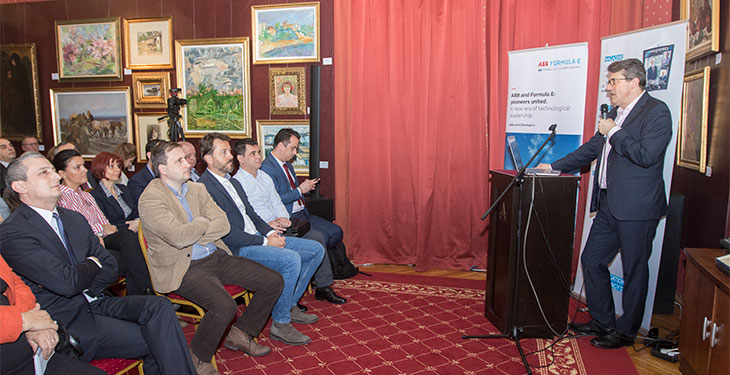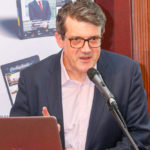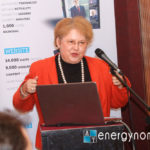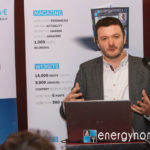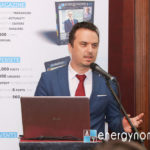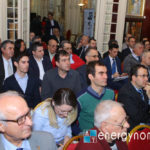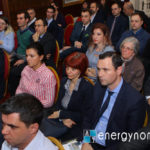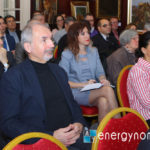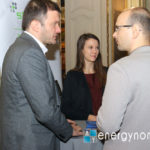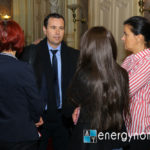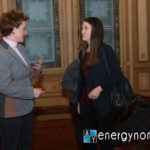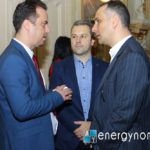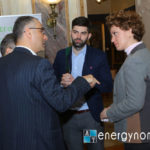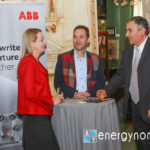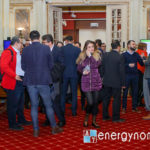The first edition of this year’s Energy Breakfast Club series – “IoT in and for the Energy Industry”, brought together at Cesianu Racovita Palace in Bucharest four speakers representing very diverse organizations. Each of them, along with over 60 people in the audience, recognizes the importance of Internet of Things – IoT technologies, but each has brought into attention different aspects, also colored in different emotions. One conclusion after 2 hours of free and open debates is that deep trends, such as are the global trends, remain relevant in Romania, even though the situation here is and appears to faster become disconnected from the European and global realities.
The first presentation came from Tomasz Wolanowski, Country Managing Director of ABB Romania.
ABB prepares for 200 more robots in Romania
Having the perspective of an active player in all sectors that are and will be affected by the digitization, Tomasz Wolanowski quickly exposed solutions already implemented and tested in the utilities, industrial, transport and infrastructure segments. In Romania, too, it increases the number of those who understand that bringing together IT innovations with technological and operational expertise reduces maintenance costs for industrial equipment, contributes to energy savings while reducing the number and impact of incidents that result in production downtime..
- Tomasz Wolanowski, Country Managing Director ABB România
- Carmen Neagu, Strategy & Business Development Counselor, EnergoBit
- Horia Garlonta, Head of Scada Departament, Eximprod
- Bogdan Cojocaru, Business Development Manager la Stratum Enclosures
“Currently, ABB has a fleet of 2,000 robots installed in Romania. Every robot produced by us since 1986 can be connected to the Internet, to our servers, for using our remote monitoring services. We can send reports to the user about how the robot works and what needs to be done”, explained Tomasz Wolanowski, adding that based on this information, ABB’s experts can offer suggestions for optimizing robots fleets. “In 2005, no ABB robots in Romania were connected to online services. At present, 13 robots are connected online and we expect that in 2019, at least 200 more ABB robots will be connected to remote monitoring systems in various industrial sectors”, said Tomasz Wolanowski.
DOWNLOAD THE PRESENTATION OF TOMASZ WOLANOWSKI
For 2019, the critical element, according to Tomasz Wolanowski, will be the low level of investment in energy and utilities. “Modern technology is becoming more and more present, but low investment volumes do not yet allow the creation of a critical mass that radically changes the situation”, the ABB official said.
Romanian companies have to work together to stay in the market
Carmen Neagu, Strategy & Business Development Counselor, EnergoBit, has exposed the results of the most recent analysis on digital performance at European level. Romania occupies the last place among the UE member states, she noted, and then she detailed where does Romania stand on each of the criteria taken into account in the construction of the DESI index: Connectivity, Human Capital, the Use of Internet Services, Digital Public Services, and Integration of Digital Technologies. “We have to accept where we stand at present and, starting from this true picture, to position ourselves and to act so that we can improve things”, Carmen Neagu pleaded.
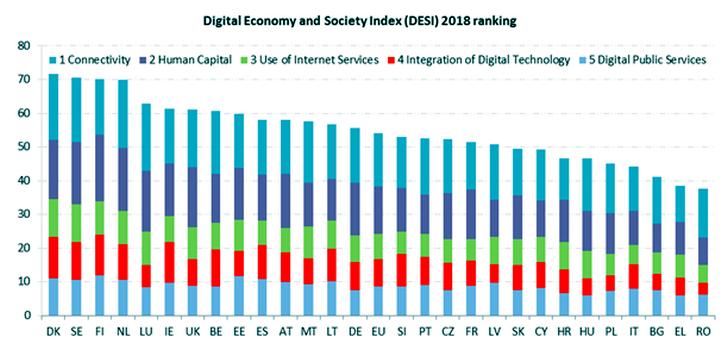
“Internet of Things will happen, it is happening already, with or without us”, warned Carmen Neagu, urged for a closer cooperation of Romanian companies and expertise as the only chance for development, or even survival, in an economic environment increasingly dominated by a less and less individuals and organizations. “The most likely scenario seems to be an intensification of regional divergences. In Europe there is already a visible digital divide, mainly between urban and rural areas, and one of the questions is where it is best to allocate financial resources: for reducing disparities between regions or for strengthening (urban) centers of creativity so that they be able to compete against the others?”
In this context, energy and utilities in Romania suffer from a lack of a unified development vision, all the more necessary given the local specificity: an energy sector divided based on the primary resources used.
SCADA solutions from Eximprod have developed with the market
In his intervention, Horia Garlonta, Head of Scada Department, Eximprod, talked about how the interest in energy and automation for energy have steadily increased over the last decade or more. “Since 2005, at Eximprod, we have been building architectures and we have been integrating equipment so that dispatchers controlling medium and high voltage lines can be more efficient in maneuvers that have to be executed for the population and all other consumers to have access to services, in case of failures, too”, Horia Garlonta said, explaining the scope of activity of the Scada department in Eximprod.
In the renewables boom period, it has increased the interest for solutions to integrate information in wind farms. “We had already started to rely on our own products, but we are mainly working with integrators,” added Horia Garlonta. There is growing demand from the industrial players for the integration of different devices in the plant, the technological flow and the energy management, he continued: “I see more and more people connected and present online in all areas of activity”.
In the utilities sector, the development and integration of IoT has occurred naturally, as more and more devices are being interconnected, first locally, then in a dispatch center. “Some of the partners we work with in Romania and abroad have up to 3,000 installations connected to SCADA systems and below these there are yet other thousands of equipment items.” The next step was to make calculations and predictions based on the information obtained, even in real time, to select and distribute different sets of information to different users within the same organization.
An important step for Eximprod was also the development of software programs running directly on routers, based on a partnership with CISCO. “We are talking about an IT-OT interconnection that allows not only more security in communications, but also access to SCADA functions”, said Horia Garlonta.
Stratum Enclosures – tailor-made solutions for energy independence
Bogdan Cojocaru, Business Developer manager at Stratum Enclosures, offered the perspective of a company integrating the expertise and the action model in telecom with energy needs. As part of the IPT PowerTech Group, Stratum Enclosures manufactures tailor-made solutions adapted to meet customers’ needs, combining energy and telecommunication. “We do not sell in Romania, because there is no interest here in what we do, namely ESCO telecom services. 99% of our production goes abroad, mainly in the EMEA area, but also in Myanmar, and our customers are major global telecom companies and large railway companies.”
Given that the price of energy increases each year, the main trend at a global level is obtaining increased efficiency in energy production and consumption, for households and industrial users, Bogdan Cojocaru said: “Everybody wants to get as close to energy independence as possible.”
Stratum Enclosures is also interested in the program of Environmental Fund Administration – AFM to support the production of photovoltaic energy by prosumers. “For an typical household, a solution that includes photovoltaic panels and battery storage can cost less than 5,000 euros. We make the studies based on GPS point, then we make the technical analyzes and, based of these, we provide a personalized offer”, Bogdan Cojocaru explained.
Energy Breakfast Club was organized by energynomics.ro amd supported by our partners: ABB România, EnergoBit, Eximprod, Stratum Enclosures.
Around 60 representatives from ABB România, AFEER, Alianța pentru energie regenerabilă, BCR, Belvedere, Bioterpena, Bureau Veritas, Caranda, CNR-CME, Conpet, COS Târgoviște, EcoHorneț, EFK, Elcen, Emerson, EnergoBit, Energy Distribution, ETTI UPB, Eximprod, Facultatea de Administrare a Afacerilor, Flack, Flashgroup, Garanti Bank, Hitachi, ICEMENERG, INCDMTM, Investisia Group, Kerui, Klarwin, Leader Team, Matei Conf Grup, MET Energy România, Metarom Industries, MGM Energy, Monitorul de Petrol și Gaze, AIIR Valahia, Phoenix Contact, Phon Soft, Photon Energy, Prime Telecom, Pro Demand, Professional Engineering Solutions, Revista Electricianul, Ringhel, Siemens, Sixt, Spectrum Technologies, Stratum Enclosures, Transelectrica, Unilever, UTCB attended the presentations and participated in discussions.
Participation
This year, energynomics.ro will organize a leat 6 Energy Breakfast Club meetings. The schedule and the proposed themes for 2017 are available in the Energy Breakfast Club dedicated page.
